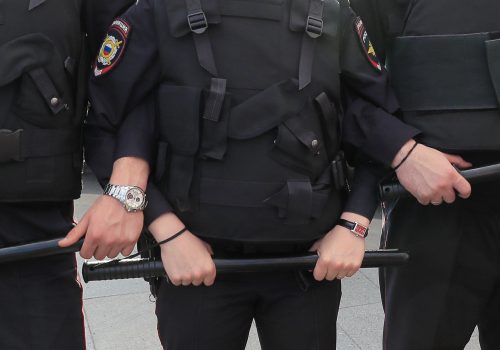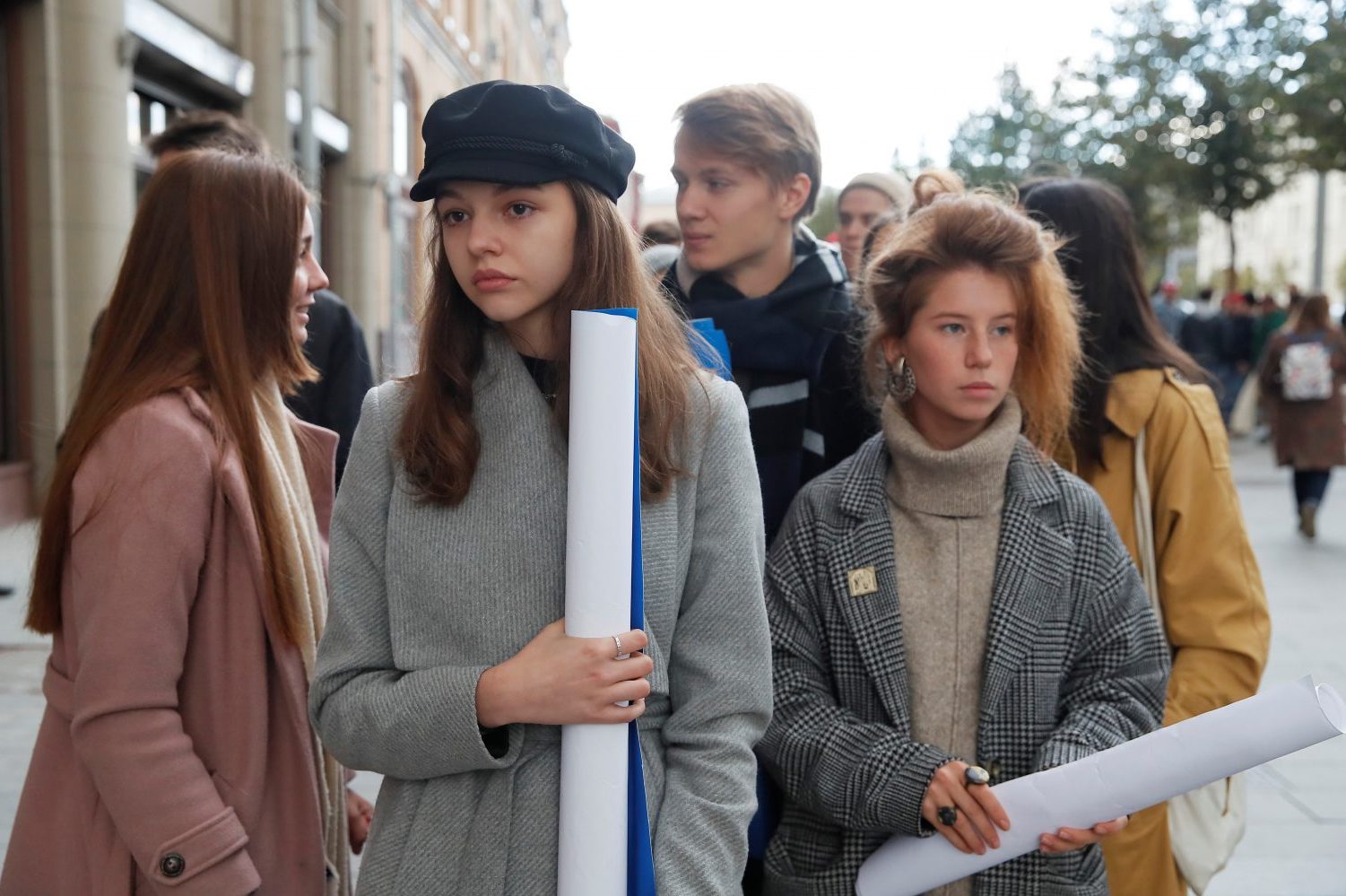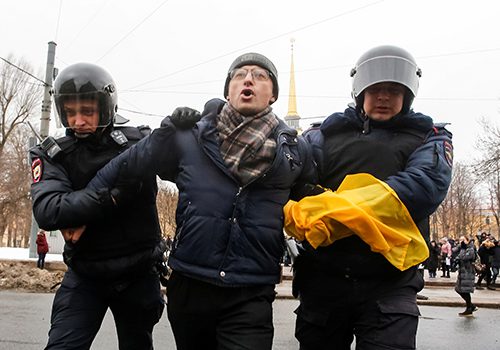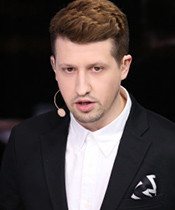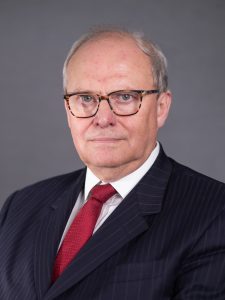Prospects of the Russian protest movement
The Take
- Moscow's summer of protest reveals growing societal divisions & frustration with the Kremlin and its policies
- Russians are increasingly willing to take to the streets to show their displeasure with their political & economic situation
- Non-systemic opposition are gaining political ground but face significant challenges if they are to achieve major future political victories
The eruption of protests on the streets of Moscow in early August was the culmination of demonstrations the previous month after election officials barred opposition candidates from running for City Council, citing irregularities in the signatures collected to put them on the ballot.1“Moscow protests: Opposition rally ‘largest since 2011,’” BBC, August 10, 2019, https://www.bbc.com/news/world-europe-49305129. Hundreds were arrested as the protests repeated for several weekends in a row amid police crackdowns against demonstrators and opposition figures.2“Moscow: Thousands protest local election,” Deutsche Welle, August 10, 2019, https://www.dw.com/en/moscow-thousands-protest-local-election/a-49979411.
The results of the 2019 Russian municipal and regional polls were foreseeable, but contained a few surprises. In the regional elections, all sixteen pro-Kremlin governors were re-elected, including Alexander Beglov in Saint Petersburg, whose victory was preceded by numerous violations.3“Единый день голосования в России. Главное,” Meduza, September 8, 2019, https://meduza.io/feature/2019/09/09/proval-edinoy-rossii-v-habarovske-beglov-v-peterburge-sistemnaya-oppozitsiya-v-moskve. Although United Russia dominated in the regional elections, the ruling party suffered significant losses in Moscow elections: they were able to get only twenty-five out of forty-five seats while the opposition parties received twenty seats, thirteen of which were taken by the Communist party—quite an unusual outcome for the city, where the Communists have been rarely supported by voters. Many explain this victory as a result of a “smart voting” strategy, launched by Alexei Navalny and designed to rally support for the registered candidates in Moscow’s election with the best chance of defeating a pro-Kremlin candidate. But whether the “smart voting” strategy played a crucial role in the results or not, the outcome of Moscow’s election has confirmed both the growth of protest moods among the population and the opposition’s ability to mobilize joint actions.4“Поражение в Москве, победа в регионах: итоги выборов 8 сентября,” The Bell, September 9, 2019, https://thebell.io/porazhenie-v-moskve-pobeda-v-regionah-itogi-vyborov-8-sentyabrya/.
As these kinds of protests in Russia become increasingly common, polls tell us that Russians have been losing confidence in President Vladimir Putin. But those two trends do not add up to a popular movement for change. They may be frustrated, but Russians are also too divided and anxious to coalesce around a revolutionary vision or action.
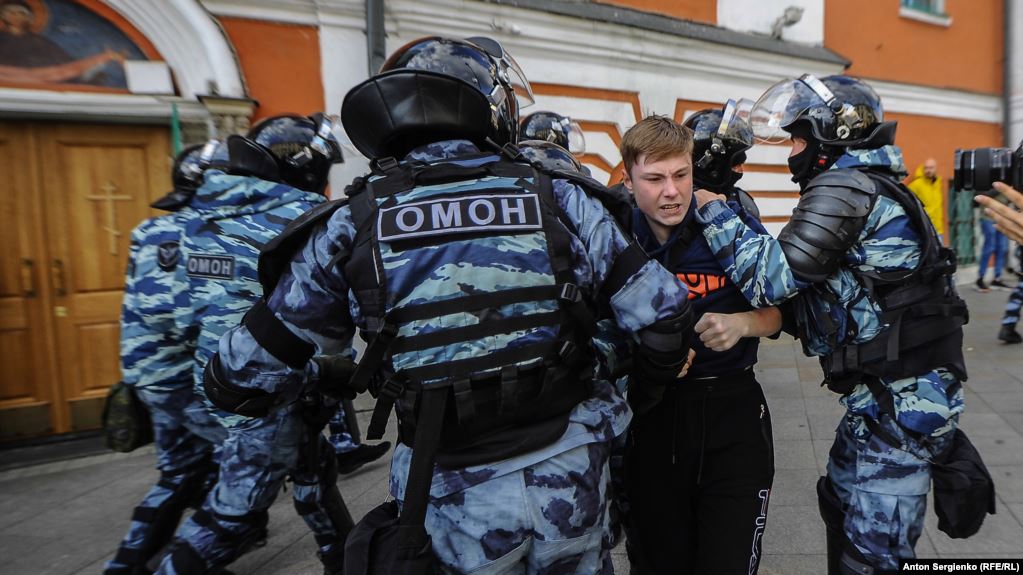
Following the barring of opposition candidates in Moscow city elections, protests on the streets of Moscow continued throughout August 2019, with over 2,000 protestors detained. Photo credit: Anton Sergienko (RFE/RL)
Putin’s declining popularity and its causes in Russia
The last year has seen a shift in the mood of the Russian public that, in combination with several other trends, could spell trouble for Putin, were it not for the opposition’s inability to unify Russians and counter the government’s shopworn narrative.
Most significantly, public confidence in Putin is waning. In a January 2019 poll by the Russian Center for Public Opinion Research (VCIOM), the level of confidence in Vladimir Putin had reached its lowest point in thirteen years. At that time, only 33 percent of respondents expressed confidence in the president5.“Опрос: доверие россиян к Путину сократилось до 13-летнего минимума,” BBC, January 25, 2019, https://www.bbc.com/russian/news-47008309. By late May 2019, the number had fallen to 31.7 percent,6“Рейтинги доверия политикам, одобрения работы государственных институтов, рейтинги партий,” VCIOM, May 24, 2019, https://wciom.ru/index.php?id=236&uid=9707. which, according to Radio Liberty,7“Рейтинг доверия россиян Владимиру Путину обновил исторический минимум,” Radio Svoboda, May 25, 2019,
https://www.svoboda.org/a/29962455.html. is the lowest rating since the center began asking the question. This indicator started to slide in the summer of 2018,8“Рейтинги доверия политикам, оценки работы президента и правительства, поддержка политических партий,” VCIOM, May 31, 2019, https://wciom.ru/index.php?id=236&uid=9728. as Putin signed into law hikes in the retirement age and the country’s value-added tax rate, even as people’s real incomes continued to decline.
Ironically, VCIOM also reported in late May 2019 an increase from January 2019 in Putin’s job approval,9“Рейтинги доверия политикам, оценки работы президента и правительства, поддержка политических партий,” VCIOM, May 31, 2019, https://wciom.ru/index.php?id=236&uid=9728. from 61.7 percent to 64.5 percent. The agency explained the discrepancy between the confidence and job approval numbers by saying it had adopted a new, more accurate method of conducting surveys soon after releasing the bruising results of the public-confidence question.
That explanation, though, raises a few questions. First, in March 2019, VCIOM had put Putin’s job approval at its highest level since the beginning of 2019,10Алексей Дегтярев, “Рейтинг одобрения деятельности Путина достиг максимума за полгода,” Взгляд, March 22, 2019, https://vz.ru/news/2019/3/22/969654.html. 65 percent, even as his confidence rating hit 33 percent. What can account for that discrepancy? Second, May’s 64.5 percent cannot be called “growth” from the March figure of 65 percent, by anyone’s reckoning. For all of VCIOM’s claims about new methodology, Putin’s ratings continue to decline.
Also, notably, the number of Russians who support Putin’s foreign policy, usually a solid indicator for the president, decreased in 2018.11“Опрос социологов: уровень поддержки внешней политики Путина снижается,” Radio Svoboda, August 9, 2018,
https://www.svoboda.org/a/29421583.html.
Another ominous trend for Putin and his government is the recent growth of protest activity in Russia. Anastasia Nikolskaya,a researcher at Kosygin Russian State University who has for years studied the attitudes of the Russian public, told this year’s meeting of the Free Russia Forum in Vilnius:
A year ago, Russia’s domestic policy was condemned by many, but the majority approved of the couy’s foreign policy and emphasized the importance of the idea that other countries fear Russia. However, in October the request for a peaceful foreign policy was clearly made. There is also a growing tendency of [Russians] fighting for their rights by constitutional means. Respect is among the most important Russian values, so the arrogant statements of low-level local officials make people feel even more offended. It’s fair to say that people have changed.12“Первый день 7-го Форума свободной России. Прямая трансляция,” Free Russia Forum, June 3, 2019, https://www.forumfreerussia.org/multimedia/video-ffr/forum-vii-video/2019-06-03/pervyj-den-7-go-foruma-svobodnoj-rossii-pryamaya-translyatsiya/ffr/.
In a May interview with Russian independent news agency Znak.com, Nikolskaya said there is a “revolution in the mass consciousness of Russians” and that “people want autonomy for their regions.”13“Полная неадекватность власти, как будто мы с ней живем в разных мирах,” Znak, May 20, 2019, https://www.znak.com/2019-05-20/proishodit_revolyuciya_v_massovom_soznanii_rossiyan_intervyu_s_sociologom.
These demands for respect and self-government, along with rising skepticism of Putin, are being made as the economy and living standards continue to decline. “Stagnation in the Russian economy has become quite familiar, and it cannot be overcome within the framework of the economic logic that has dominated since 2012 among the Russian elites,” Vladislav Inozemtsev, economist and director of the Center for Post-Industrial Society Studies, wrote in June.14Vladislav Inozemtsev, “На пороге революции. Владислав Иноземцев о том, как элиты потеряли чувство самосохранения,” The Insider, June 10, 2019, https://theins.ru/opinions/160359. This stagnation, Inozemtsev wrote, is wearing people out:
The situation is aggravated by the fact that the authorities consciously create in people’s minds a sense of life in a ‘besieged fortress’ and thus send a signal that we should not expect our lives to improve in the near future. Under the circumstances, the authorities should not be surprised by the decline in their popularity. Such a course in four to five years can create a fully revolutionary situation, which no fabricated ratings and made-up growth rates would be able to prevent.
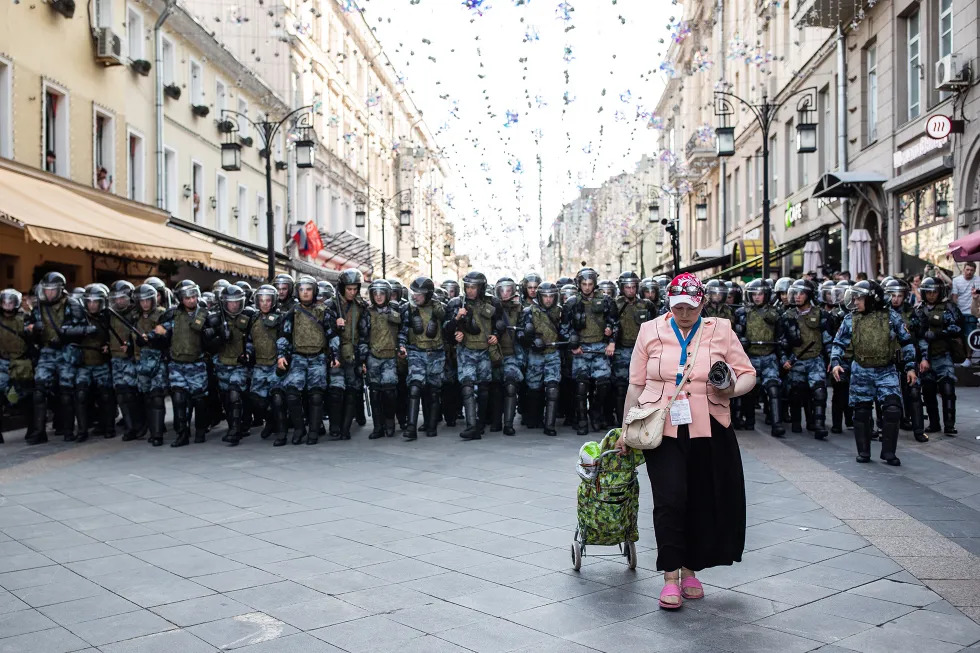
The Kremlin’s response to the 2019 summer protests has been widely condemned as heavy-handed and excessive by both Russians and the international community. Photo Credit: Evegeny Feldman
At least two large-scale protest movements in recent months—both regional and federal—illustrate these trends.
First, citizens in Yekaterinburg, an industrial city in the Urals and the fourth largest city in Russia, protested the construction of a cathedral on one of the city’s most popular squares in the heart of the city. The huge mass of demonstrators carried the day, and even Putin had to acknowledge the conflict.15“Путин предложил провести опрос о строительстве храма в Екатеринбурге,” Radio Svoboda, May 16, 2019, https://www.svoboda.org/a/29944551.html. The protest, perhaps the biggest since 2012, did not end with one or two rallies, but grew into a tent city that did not break up until demonstrators’ demands were heard. The Uralians’ determination spooked both officials and “patriotic activists”—members of pro-Kremlin youth organizations used to spread government propaganda and discredit political opposition—who dubbed the speeches in Yekaterinburg “the Ural Maidan.”16Zergulio, “Пять минут до Майдана на Урале. Скандал вышел на федеральный уровень, чиновники в растерянности,” Live Journal, May 14, 2019, https://zergulio.livejournal.com/6341960.html.
The second action, which spread across Russia, was the movement for the release of investigative journalist Ivan Golunov, on whom police had planted drugs in order to fabricate a criminal case. Outrage over Golunov’s plight was so widespread that the case against him was dropped and authorities launched an investigation into who fabricated evidence against him.17“Дело Голунова’ передадут в Следственный комитет,” Radio Svoboda, June 21, 2019, https://www.svoboda.org/a/30012590.html.
Challenges facing Russia’s protest movement
For all its growing strength, however, the Russian protest movement’s vulnerabilities keep it from blossoming into a genuine threat to Putin’s regime.
First, most protests have been about local issues, which obviously cannot galvanize Russians from coast to coast. In addition to Yekaterinburg, there was a string of local, wintertime protests across Russia against landfills.18Evan Gershkovich, “Thousands Protest Against Moscow’s Plan to Dump Its Trash in Russian Regions,” Moscow Times, February 3, 2019, https://www.themoscowtimes.com/2019/02/03/thousands-come-out-in-protest-against-moscows-plan-to-dump-its-trash-on-russian-regions-a64376. Then in the spring, a series of environmental protests took place in various regions,19Мария Кольцова, “Протесты выходных: против вырубки лесов и призыва в армию,” MBK, April 20, 2019, https://mbk-news.appspot.com/region/protesty-vyxodnyx-protiv-6/. as well as protests against domestic violence.20“Даже небо плачет»: жители Новосибирска потребовали защитить жертв домашнего насилия,” Tayga.info, August 18, 2019, https://tayga.info/148272.
Second, a formidable protest movement requires that different parts of society come together to either seek a common goal or voice a common objection. For example, Ukraine’s Euromaidan united patriotic and nationalist forces, the liberal intelligentsia, and most of the clergy. Maidan was supported by the priests of the Ukrainian Orthodox Church of the Kyiv Patriarchate, some priests of the Moscow Patriarchate, Catholic and Protestant churches, and some Muslim and Jewish religious leaders—along with the military, some representatives of the security forces, middle class businesspeople, human rights activists, statesmen, and anarchists. That is why Maidan was not just a “liberal protest,” but a real, popular revolution.
In contrast, during the Yekaterinburg protest, view there were splits not only among citizens but also within the protest movement itself. On the one hand, it coalesced many ecologists, supporters of democratic transformations, and previously indifferent citizens. On the other hand, some people broke away from the dissident movement due to discrepancies in the “church matter,” and some dissidents were grateful to Putin when he eventually intervened.
Citizens in Yekaterinburg, an industrial city in the Urals and the fourth largest city in Russia, protested the construction of a cathedral on one of the city’s most popular squares in the heart of the city. Source: RFERL
Third, a protest movement becomes a threat to those in power when people realize that the current government cannot meet their key demands. If people see no possibility of agreement among themselves and do not view appealing to higher authorities as the only way to solve their problems, their protest activity will never go beyond the local level.
In Russia, discontent and anger have repeatedly given Putin the opportunity to play the benevolent tsar, arbiter and solver of problems. For example, during the Yekaterinburg protests, the Russian president proposed a survey on the construction of the cathedral. If a majority favored it, the park would be moved elsewhere.21“Путин предложил провести опрос.” He did not reflexively side with the Church and even showed some understanding of the protesters’ argument. Some activists welcomed his intervention. It probably helped that the protests were not formally against the government, even though the overwhelming majority of Russians rightly see the Russian Orthodox Church as an extension of the Kremlin.
In these three key ways, the Yekaterinburg protests lacked the elements necessary to become a national movement, but they still mattered: As sociologists point out, such actions help citizens develop their potential to protest and show them that mass protests are an effective way to protect their rights.
Aside from mass repression, some uniquely Russian circumstances have so far prevented the kind of social cohesion necessary to create a large and consequential protest movement: fear of an external threat from which Russians need to be protected, the lack of a consolidating idea, and the lack of consensus about what the future should look like.
Domestic Kremlin propaganda is not aimed at denying the facts of air pollution, corruption, or other social problems, the frequent targets of local protests. Coverage of those topics is frowned upon, but it is not absent. Official corruption and incompetence were even the subjects at least two popular TV comedies in 2018, Year of Culture and House Arrest.
None of those issues can generate a serious, nationwide protest movement that could lead to systemic changes and threaten Putin, because Russians are more afraid of the specters dreamed up by the Kremlin than they are outraged by lawlessness and falling living standards. What are those specters? The menacing West and the return to chaos, devastation, and even war that they have been told to expect if Putin and his system are overthrown. These are particularly rattling possibilities to a Russian populace that, despite post-Soviet liberalization, still feels heavily reliant on the state. If the state were to disappear or be crippled, most Russians do not have sturdy, independent support systems to fall back on. In comparison to that kind of existential threat, people’s everyday problems pale in insignificance. As long as Russians see in Putin a defender and savior from these threats, they would not dare to participate in a revolutionary protest.
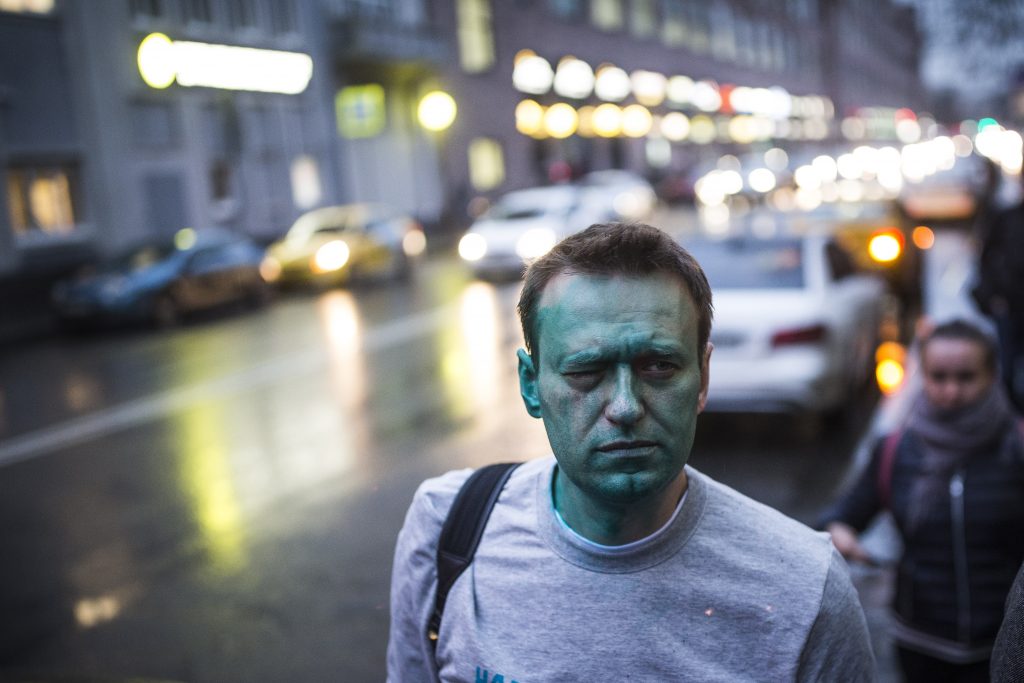
Despite being the most well-known non-systemic opposition leader and the subject of Kremlin harassment, Alexei Navalny has not yet enough political support to lead this opposition into the mainstream. Photo Credit: Wikimedia Commons.
Russia’s distinct lack of social support systems makes it nearly impossible for citizens to develop separation from the state. Even in the 1990s, which was a period marked by freedom, the inviolability of private property did not develop, nor did an independent judiciary or the very culture of respect for the individual. Today, almost every person comes face to face with Russia’s lawlessness and then makes vain attempts to find the truth and break through the wall of corruption. As a result, all Russians understand deep down that in their country, anything at all can happen to anyone at all. The only guarantee, though not an absolute one, of escaping this rule is being loyal to the state and having some type of relationship with it, so that the state knows who you are. The Russian sees no other way of protecting him or herself. That’s why the Russian people perceive chaos and the destruction of the state as the loss of the last possibility of protection.
As a result, even Russians who protest develop a certain self-censorship that prevents them from going beyond a certain point. For example, Golunov himself refused to attend an unsanctioned protest action that was organized to support him,22“Голунов не пойдет на акцию в его поддержку 12 июня,” Interfax, June 11, 2019, https://www.interfax.ru/russia/664892. and Ivan Kolpakov, the editor-in-chief of Meduza, the news organization where Golunov works, said, “We rescued our guy … but we do not engage in activism and do not want to be heroes of resistance.”23Ivan Kolpakov, Facebook, June 11, 2019, https://www.facebook.com/ivan.kolpakov/posts/10220196857938244.
This fear of chaos and attack from a foreign power also helps explains why the Russian opposition’s most animating idea, the fight against corruption, has not ignited a large movement—indeed, Russian authorities often strengthen their grip on institutions and officials under the guise of fighting corruption. Meanwhile, most Russians put up with graft in order to avoid a greater evil; they are convinced that theft is inevitable under any type of government and that a liberal government, in addition to looting Russia, would try to destroy the country on the order of overseas bosses.
This, in turn, helps explain why Russia’s most zealous anti-corruption crusader, Alexei Navalny, does not command much of a following. “[S]upport for Alexei Navalny is not so high, firstly, because many consider him an agent of the State Department or an agent of the Kremlin,” noted Anastasia Nikolskaya in her speech at the Free Russia Forum in June 2019. “[S]econdly, people believe that he does not offer any concrete methods to improve the situation, and proposes to fight not with corruption, but with corrupt officials,” Nikolskaya said.24“Первый день 7-го Форума свободной России. Прямая трансляция.” She added that the absence of leaders recognized by the people is one of the main problems of the modern protest movement.
Most Russians are not impressed with current government officials, but they do tend to adhere to the old Soviet mindset and are distrustful of liberal leaders. To the average Russian, no person in the modern Russian political field truly aligns with their ideals of what a leader should be.25“Полная неадекватность власти, как будто мы с ней живем в разных мирах,” Znak, May 20, 2019, https://www.znak.com/2019-05-20/proishodit_revolyuciya_v_massovom_soznanii_rossiyan_intervyu_s_sociologom.
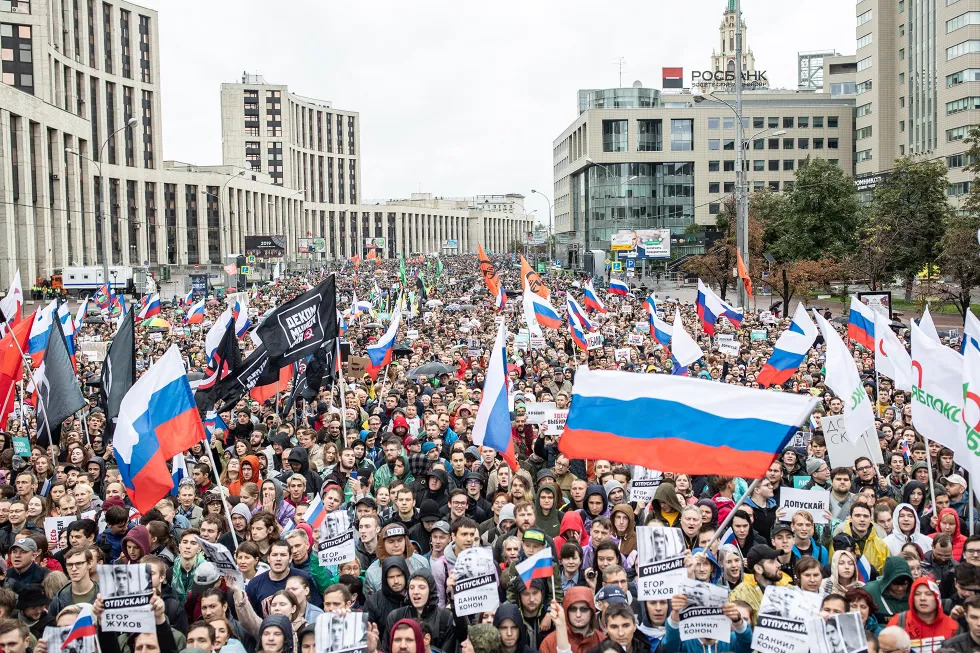
On July 20, protesters met on Moscow’s Sakharov Prospect to demand that opposition politicians running for Moscow City Duma seats be permitted to register their candidacy. By 3:30 PM, about 21,500 people had joined the protest according to the White Counter. Photo Credit: Evegeny Feldman.
Despite this, Navalny remains the de facto leader of the Russian protests. As Founder of the Anti-Corruption Foundation, Navalny has authored high-profile anti-corruption revelations of senior officials. After trying to challenge Putin for the presidency in the past, the Kremlin created new eligibility requirements that bar individuals from running for president if they’ve been arrested—something of a frequent occurrence for anti-corruption protestors. Today, he has a rather strong team supporting him in organizing these protests, including economist and former government official Vladimir Milov and Anti-Corruption Foundation lawyer Lyubov Sobol.
Part of the protest movement also recognizes the paradoxical benefit of government corruption: the fiercest critics of Russia’s foreign policy are mindful that illicit personal enrichment funnels away resources that might otherwise go toward wars and subversive operations in Western countries.
Finally, Russians cannot agree on what type of future they should be advocating for, which contributes to the absence of unifying leaders and protest strategies. For example, since 2001, the independent Levada sociological agency has periodically asked Russians what they think of Joseph Stalin.26“Уровень одобрения Сталина россиянами побил исторический рекорд,” Levada Center, April 16, 2019, https://www.levada.ru/2019/04/16/uroven-odobreniya-stalina-rossiyanami-pobil-istoricheskij-rekord/. This year, the Soviet dictator got his highest-ever marks, with 51 percent of respondents professing admiration, respect, or sympathy for him. Combined with those who claimed indifference, 77 percent of respondents had a favorable or neutral view of Stalin. The share of those who said they respect him was up by 12 percent over last year.
Subscribe for the latest on Russia
Receive updates for events, news, and publications on Russia from the Atlantic Council.
Many commentators with liberal views said the poll was evidence that Stockholm Syndrome had gripped the population, and some even accused the Levada Center of distorting the results—but they are the logical result of decades of Russian propaganda, which has depicted Stalin not as a specific historical figure but rather as a set of qualities and actions that Russians expect from contemporary authorities.
The paradox is that Stalin’s new propaganda cult, originally intended as a pillar of Putin’s rule and to maintain his image as the new Stalin, is turning increasingly against the Russian president. And the less that people tend to trust Putin, the more they seem to like Stalin. Introduced into the media space to bolster the image of a strong leader and strong state in the mass consciousness, Stalin is no longer so much legitimizing Putin’s dictatorial tricks as discrediting him.
Corruption and the looming threat from the West are issues where the former Soviet dictator particularly shows up his successor. While Putin sits atop a corrupt system, Stalin’s admirers say he would have locked up the highly placed crooks and thieves long ago. And while many acknowledge that Putin is doing a good job of defending Russia from external enemies,27“Путин отлично выполняет свою работу – защищает Россию от внешних врагов?” Mail.ru, https://otvet.mail.ru/question/166343070. they question why he has not dispatched them after all these years. Russian television warns that the threat comes not only from mighty Washington but also from Ukraine, which could attack any day.
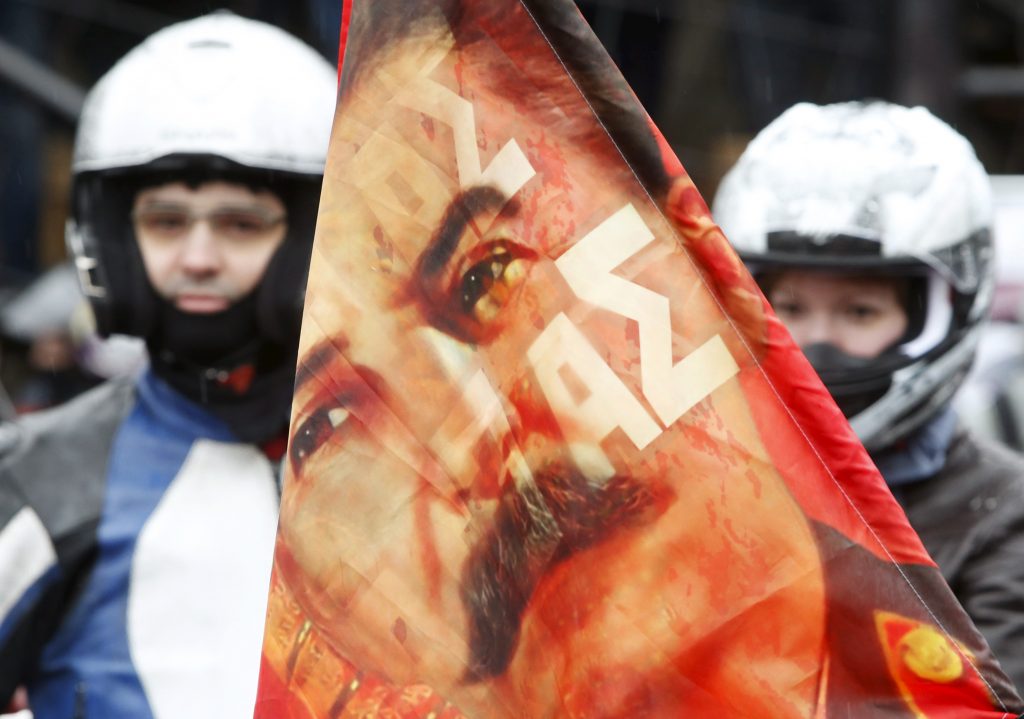
Bikers gather near a flag showing a portrait of Soviet leader Joseph Stalin before a farewell ceremony to see off participants of a bike ride, commemorating the 70th anniversary of the victory over Nazi Germany in World War Two, at a bike centre in Moscow, April 25, 2015. Photo Credit: REUTERS/Sergei Karpukhin
Another factor at play is that under Putin, especially against the background of falling living standards and pension reform, there is certainly no social justice. For anyone that buys into the revisionist pro-Stalin propaganda, this is a far cry from the supposed social justice of the general secretary.
Seen in this light, growing support for Stalin is less a sign of growing support for Putin and his policies than of opposition to them. Even the Military Review,28“Гнёт ‘стабильности’ делает нас сталинистами?” Военное обозрение, April 22, 2019, https://topwar.ru/157040-gnet-stabilnosti-delaet-nas-stalinistami.html. known for its loyalty to the Kremlin, gets the point. Viktor Kuzovkov, one of the authors on its site, writes:
Stalin’s sharp rise in popularity is nothing but a veiled, so far drawn-inward, protest of society against the actions of our government and those who now represent it. … This is, if you will, the ‘internal opposition’ that philosophers sometimes talk about and comedians sometimes joke about. Now it has become a reality for 51 percent of Russians. And no matter who really relates to Stalin’s personality, such a percentage of potential oppositionists must somehow convince the Kremlin that it is losing control of the situation and is on the verge of significant changes.29“Гнёт ‘стабильности’ делает нас сталинистами?”
Of course, Russia’s liberal opposition rejects the notion of Stalin as the embodiment of the country’s restive mood, while Stalin’s admirers aggressively refuse to see liberal dissidents as the custodians of their aspirations. The image of the “Glorious Future Russia” for these groups is radically different. Many are unhappy with the state of things, but they seek opposing outcomes. Some celebrities, including popular video bloggers and rappers, attended the Moscow protests, but none took the lead and offered a clear vision of the desired future.30“На протест в Москве пришли российские знаменитости,” Факты, August 10, 2019, https://fakty.com.ua/ru/svit/20190810-na-protest-u-moskvi-pryjshly-rosijski-znamenytosti/.
For all these reasons, an effective protest movement seems a long way off in Russia, but any efforts to build one will need a few specific elements.
First, it will likely consolidate around a social problem that is a direct consequence of Putin’s policies, as opposed to the actions of local oligarchs, officials, or church hierarchies. Issues that affect people in most of Russia’s regions—environmental problems, private-sector job losses, substandard health care, medicine shortages—present the best opportunities for widespread mobilization.
For example, the country lacks the funds to provide adequate medical care, productivity is dropping, basic government services are being cut, and people will have to work longer to ease the load on the government’s pension fund. Meanwhile, Moscow spends freely on the wars in Donbas and Syria, on the militarization of Crimea and Kaliningrad, on bribes for Western politicians,31“Commuting to Moscow: Lega Nord’s Pilgrimage To Russia,” Bellingcat, August 8, 2019, https://www.bellingcat.com/news/2019/08/08/commuting-to-moscow-lega-nords-pilgrimage-to-russia/. and on an army of security officials and Internet trolls. And since Putin’s rhetoric toward the West grows only more bellicose, these misguided priorities probably will not change any time soon.
Medicine shortages are an especially stark example because they are often a result of the government’s ban on drug imports from certain countries in response to Western sanctions.
A chief organizational hurdle is that members of the Russian opposition are not good at negotiating with each other and have little mutual trust. Overcoming interpersonal disagreements in the opposition may be the main condition for the selection of a leader recognized by different groups of protesters, able to organize activists and bring consistency to opposition.
Second, Russia’s modern-day dissidents will have to discredit the propaganda that is the cornerstone of Putin’s regime, specifically that the West awaits the chance to pounce on a vulnerable Russia and that regime change would unleash chaos on society.
Activists will need to show that the Kremlin has been the aggressor in its confrontations with the West and point out that friendly relations with neighbors are a better guarantee of security for Russia and its borders than a constant state of hostilities. And they will need to somehow disprove the West’s theoretical plans to attack Russia.
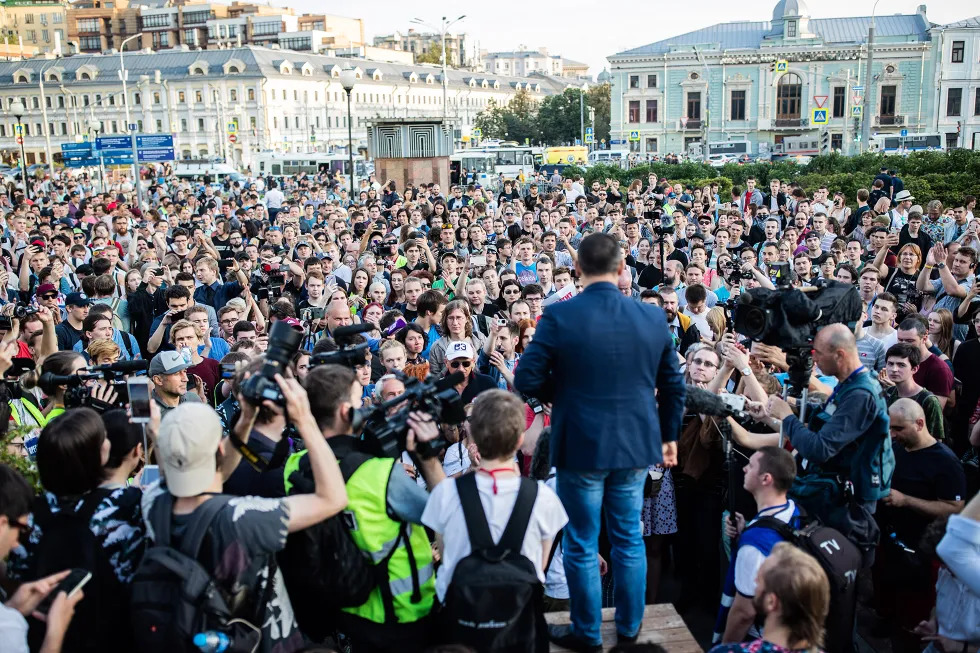
Several thousand people gathered on July 27th in downtown Moscow to protest against officials’ refusal to register dozens of independent candidates for the Moscow City Duma and in support of free elections. By the end of the day, more than 1,000 people were arrested. Photo Credit: Evegeny Feldman.
Further, Russians need to be shown that the plundering of the country and the redirection of funds to Russia directly threaten their lives and well-being. This threat could come from environmental problems that remain unaddressed, such as the 2017 release of ruthenium in the Chelyabinsk region and similar incidents that were covered up by the authorities, or from the general catastrophic oncological situation in Russia, or from the collapse of medical care and sporadic drug shortages that reduce the survival rate of cancer patients.32“Russia’s Bad Health Care System Is Getting Worse,” Newsweek, November 21, 2016, https://www.newsweek.com/2016/12/02/dire-russia-health-care-523380.html.
To take regime change and democracy out of the realm of the unthinkable, activists should offer Russians examples of other countries where the transition was successful and the government still working, such as the Baltic states, Czechia, and even Ukraine. People need to see how civil society in other countries seeks to solve problems, including through protest actions, without sparking chaos and revolution. Activists could even point to neighboring Ukraine, where people live in peace in regions where Russian troops and mercenaries are not present.
In debunking the Kremlin’s carefully nurtured fear of a return to the wild ’90s in the event of regime change, activists should remind Russians that it was the restructured Committee for State Security (KGB) and mafia, not the democrats, who plundered the country and took money abroad.33Kseniya Kirillova, “Propaganda stereotypes paralyze Russia’s potential for change,” Euromaidan Press, January 12, 2016, http://euromaidanpress.com/2016/01/12/propaganda-stereotypes-paralyze-russias-potential-for-change/. What’s more, as the economist Inozemtsevnotes, the status quo is in some ways worse than in the 1990s:
In addition, the sharp decline of the economy lasted only four years, and the new reality was sharply different from the disgraced socialism. Today in Russia there is a situation when the decline in income continues for the sixth year in a row, the retirement age is rising, the devaluation is taking place at the same rate as, for example, in 1993-1997, but at the same time the economy does not allow for successful private entrepreneurship. Law enforcement officers are robbing the population worse than any racketeers, and the social elevators have stopped.34Inozemtsev, “На пороге революции. Владислав Иноземцев о том, как элиты потеряли чувство самосохранения.”
Activists also need to imbue their actions and rhetoric with patriotism, and always stress that the change they seek aims to ensure that Russians can enjoy dignified, peaceful, and safe lives. The Kremlin will not have a monopoly on the language of security and defense if activists can convince Russians that Putin’s militarism and adventurism threaten Russia’s security. Finally, democrats need to make the point that this regime is arbitrary and that its displeasure can be directed at people of all political persuasions—that loyalty to the regime does not protect against repression. For example, it’s not only Ivan Golunov and liberal activists who have found mystery drugs in their pockets: Addiction researcher Nikolay Kaklyugin, a vocal opponent of Russia’s liberals, sits in a Novocherkassk pre-trial detention center awaiting trial on drug charges in what is widely believed to be a frame-up.35“Дело Каклюгина,” Русская народная линия, accessed September 4, 2019, https://ruskline.ru/tema/obwestvo/delo_kaklyugina/. This is not the benevolent regime its conservative defenders claim, and the fight against it should unite people of disparate views.
About the author
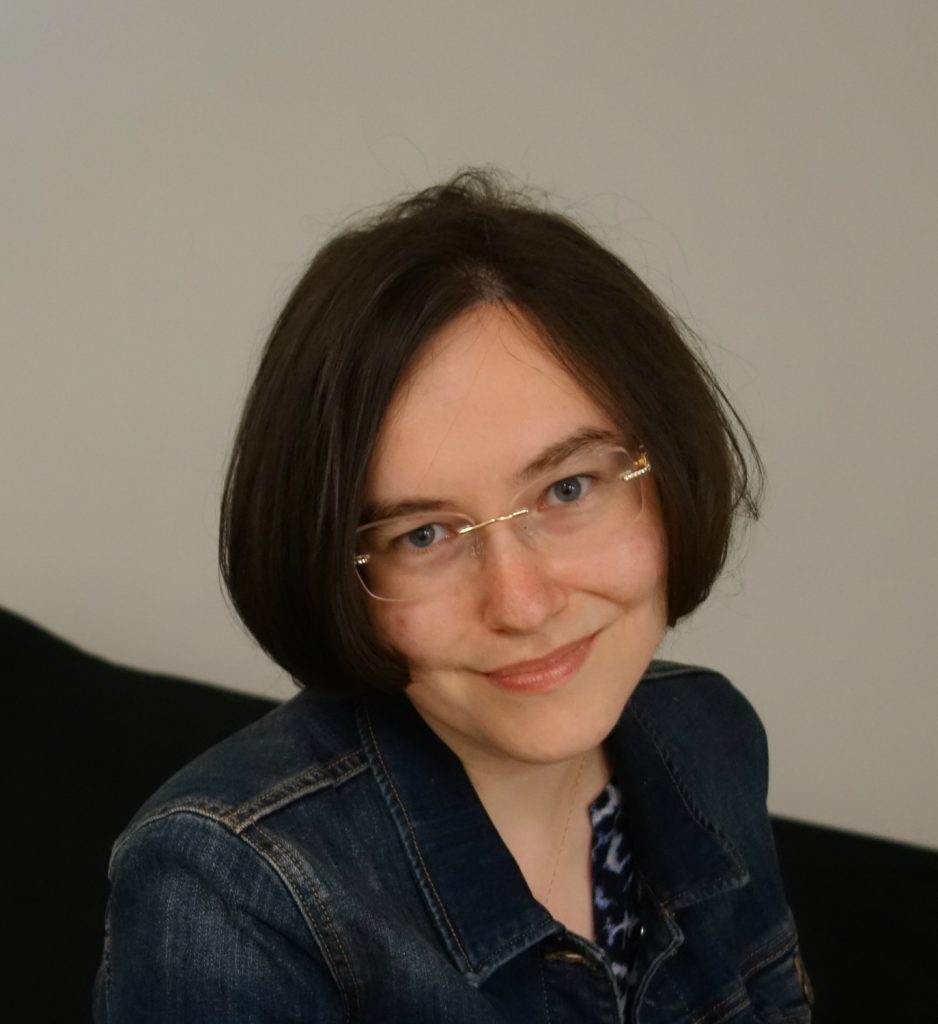
Ksenia Kirillova is an investigative journalist and analyst focused on Russian society, mentality, the mechanism of action of Russian propaganda, “soft power,” “active measures,” and foreign policy. She is the author of several hundred articles, including research on Russian propaganda and soft power for the Integrity Initiative project at the British Institute for Statecraft, Kyiv Post, Radio Free Europe/Radio Liberty, and more. While living in Russia, she worked as a journalist at Ural Worker between 2008 and 2010 and at the Ural branch of Novaya Gazeta from 2011 to 2013. Ms. Kirillova covered social problems in the region and exposed corruption, including at the FSB. In the United States, she worked with the Associated Press, Newsweek, and other media outlets. Since 2012, she is a corresponding member of the International Youth Human Rights Movement, and since May 2015, she is an expert at the Center for Army, Conversion and Disarmament Studies in Kyiv. She holds a degree in jurisprudence with honors from the Faculty of Law of The Liberal Arts University.
This publication was created in partnership with

Further reading
Related experts

The Eurasia Center’s mission is to promote policies that strengthen stability, democratic values, and prosperity in Eurasia, from Eastern Europe in the West to the Caucasus, Russia, and Central Asia in the East.
Image: Participants shout slogans during a rally to demand authorities allow opposition candidates to run in the upcoming local election in Moscow, Russia August 10, 2019. REUTERS/Tatyana Makeyeva
